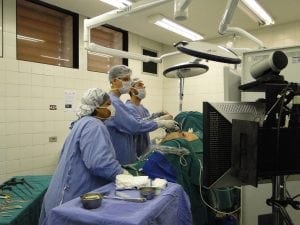Barrett’s esophagus (BE) is a condition in which the cells in your esophagus undergo a transformation, becoming more like intestinal cells. Although doctors aren’t entirely certain why this change occurs, it is commonly observed in individuals with gastroesophageal reflux disease (GERD). People with Barrett’s esophagus face a higher risk of developing esophageal cancer, especially a rare variant known as esophageal adenocarcinoma. Recent research aimed to determine whether undergoing antireflux surgery for Barrett’s esophagus could reduce the risk of esophageal adenocarcinoma.
According to Kate Burba’s report in Healio, antireflux surgery can prevent bile or stomach acid from reaching and damaging the esophagus. Therefore, there has been a longstanding belief that this surgery can reduce the risk of developing esophageal cancer. The study sought to investigate the accuracy of this belief. Researchers conducted a multinational, population-based cohort study that included all individuals diagnosed with Barrett’s esophagus in the national patient registries of Finland, Denmark, the Netherlands, and Sweden. The study encompassed data from 33,939 people.
The results, published in Gastroenterology, revealed that 1.6% of the participants (543 individuals) underwent antireflux surgery, while the remaining 33,396 individuals used antireflux medications. The patients were followed up for a 32-year period. During this time, 14 individuals (2.57%) who underwent antireflux surgery developed esophageal adenocarcinoma, compared to 437 individuals (1.3%) in the antireflux medication group.
After further analysis and adjustment, the researchers determined that individuals who underwent antireflux surgery actually had an overall increased risk of esophageal adenocarcinoma, particularly in the 10 to 32 years following the surgery. This remained true even after individuals who underwent endoscopic therapy were excluded from the dataset.
About Esophageal Cancer
The esophagus is a long, hollow tube that extends from the throat to the stomach, responsible for transporting food for digestion. Esophageal cancer, as the name suggests, develops in the esophagus, typically starting in its inner lining and then spreading outward. There are various subtypes of esophageal cancer, including sarcoma, adenocarcinoma, melanoma, choriocarcinoma, and squamous cell carcinoma, among others. Esophageal cancer is more prevalent in men than in women, with risks increasing due to factors like GERD, Barrett’s esophagus, acid reflux, obesity, smoking, and excessive alcohol consumption. Treatment options vary but may involve radiation, targeted therapy, surgery, or chemotherapy.
In the early stages, individuals may not experience any symptoms, but as the cancer progresses, symptoms may include:
- Unintended weight loss
- Esophageal obstructions
- Indigestion
- Dysphagia (difficulty swallowing)
- Heartburn
- Chronic cough
- Hoarseness
- Chest pain, pressure, or burning
- Bone pain








